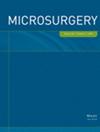Long-term outcomes in virtual surgical planning for mandibular reconstruction: A cost-effectiveness analysis
Abstract
Objective
This study is an economic evaluation comparing virtual surgical planning (VSP) utilization to free hand mandibular reconstruction (FHR) for advanced oral cavity cancer, for which the cost effectiveness remains poorly understood. The proposed clinical benefits of VSP must be weighed against the additional upfront costs.
Methods
A Markov decision analysis model was created for VSP and FHR based on literature review and institutional data over a 35-year time horizon. Model parameters were derived and averaged from systematic review and institutional experience. VSP cost and surgical time saving was incorporated. We accounted for long-term risks including cancer recurrence and hardware failure/exposure. We calculated cost in US dollars and effectiveness in quality-adjusted-life-years (QALYs). A health care perspective was adopted, discounting costs and effectiveness at 3%/year. Deterministic and probabilistic sensitivity analyses tested model robustness.
Results
In the base case scenario, total VSP strategy cost was $49,498 with 8.37 QALYs gained while FHR cost was $42,478 with 8.27 QALY gained. An incremental cost-effectiveness ratio (ICER), or the difference in cost/difference in effectiveness, for VSP was calculated at $68,382/QALY gained. VSP strategy favorability was sensitive to variations of patient age at diagnosis and institutional VSP cost with one-way sensitivity analysis. VSP was less economically favorable for patients >75.5 years of age or for institutional VSP costs >$10,745. In a probabilistic sensitivity analysis, 55% of iterations demonstrated an ICER value below a $100,000/QALY threshold.
Conclusions/Relevance
VSP is economically favorable compared to FHR in patients requiring mandibular reconstruction for advanced oral cancer, but these results are sensitive to the patient's age at diagnosis and the institutional VSP cost. Our results do not suggest if one “should or should not” use VSP, rather, emphasizes the need for patient selection regarding which patients would most benefit from VSP when evaluating quality of life and long-term complications. Further studies are necessary to demonstrate improved long-term risk for hardware failure/exposure in VSP compared to FHR.

 求助内容:
求助内容: 应助结果提醒方式:
应助结果提醒方式:


